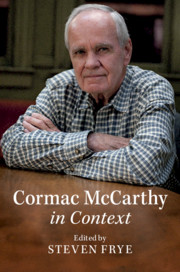Book contents
- Cormac McCarthy in Context
- Cormac McCarthy in Context
- Copyright page
- Contents
- Contributors
- Acknowledgments
- Chronology
- Part I Environments
- Part II Literary Contexts: Sources, Influences, Allusions
- Chapter 5 William Faulkner
- Chapter 6 Ernest Hemingway
- Chapter 7 Herman Melville and the American Romance Tradition
- Chapter 8 Romanticism
- Chapter 9 Naturalism
- Chapter 10 The Bible
- Chapter 11 Allusion and Allegory
- Part III Intellectual Contexts
- Part IV Social and Cultural Contexts
- Part V Archives, Critical History, Translation
- Works Cited
- Index
Chapter 11 - Allusion and Allegory
from Part II - Literary Contexts: Sources, Influences, Allusions
Published online by Cambridge University Press: 12 December 2019
- Cormac McCarthy in Context
- Cormac McCarthy in Context
- Copyright page
- Contents
- Contributors
- Acknowledgments
- Chronology
- Part I Environments
- Part II Literary Contexts: Sources, Influences, Allusions
- Chapter 5 William Faulkner
- Chapter 6 Ernest Hemingway
- Chapter 7 Herman Melville and the American Romance Tradition
- Chapter 8 Romanticism
- Chapter 9 Naturalism
- Chapter 10 The Bible
- Chapter 11 Allusion and Allegory
- Part III Intellectual Contexts
- Part IV Social and Cultural Contexts
- Part V Archives, Critical History, Translation
- Works Cited
- Index
Summary
This chapter argues that McCarthy’s first four novels, which are lumped together and called his “Tennessee period,” can be characterized by an engagement with the literary attributes of allusion and allegory, particularly allegories of and allusions to hallmarks of Western culture, such as classical drama, Judeo-Christian theology, pastoral idealism, and the symbolic allegory of Romanticism. This chapter further argues that one can see an evolution in these four novels in how McCarthy invokes allegory and allusion, an evolution that progresses from a modernist stance towards industrialism to a wider questioning of the stability of cultural meaning. In the first two novels, this chapter argues, McCarthy uses allusion to signal a simpler time lost in twentieth-century American modernity. In the second two novels, McCarthy uses the literary tropes of allegory and allusion to question meaning and authority more generally, as allusions and even rituals become simulations of meaning and artifacts become empty markers of a past significance that are stripped from their cultural foundation.
Keywords
- Type
- Chapter
- Information
- Cormac McCarthy in Context , pp. 107 - 118Publisher: Cambridge University PressPrint publication year: 2020

